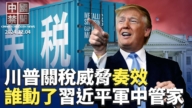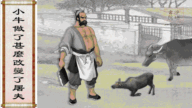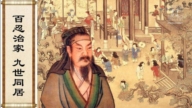【新唐人2011年11月15日讯】大陆新闻出版总署署长最近公开表示,国内很多文化艺术作品创造力不够,9成作品属于模仿和复制﹔中共当局将通过设立文化创意扶持体制和基金来提高创新能力。文艺人士则认为,大陆的文化管制非常严厉,这种管制不取消,提高基金不会起到任何好的作用。
11月12号,在北京召开的“2011中国版权年会”上,大陆新闻出版总署署长、国家版权局局长柳斌杰公开表示,目前国内很多文艺作品创造力不够,90%的作品是模仿和复制的。他举例说,大陆现在年产文艺作品达到4300多部,但是公众知道的、观看的并不多,原因就是创新能力不强﹔很多人喜欢看外国大片,因为对方的创意好、传播能力比较强。
他表示,将从中央到地方提供资金来扶持,福利彩票的相当比例也将倾向文化领域。
对此,大陆文化评论人叶匡政对《新唐人》表示,在大陆文学界,政府现在每年就已经投入大量的钱来扶持文学创作,但这些基金大多被体制内的作协官员占用,真正有创造力的、体制外的作家很难获得政府资助。
大陆文化评论人叶匡政:“这些活力,其实大多数存在民间、或者体制外的作家中。因为稍微有点个性或者骨气的作家,都不可能唯作协或者目前的政党——中共的态度,唯马首是瞻的,这种可能性是不大的。所以,它基金发放的越多,只不过给了这些所谓的体制内的文学官员,来制造垃圾文学。”
前《中国民营》杂志记者、专栏作家刘逸明也认为,这种资金扶持的做法不会起到任何好的效果,只会滋生腐败。
专栏作家刘逸明:“因为中国的文化艺术事业被政治压制的太厉害,所以,很多人没有创造力,不是因为他们不想有创造力,而是因为这个制度压制。”
《旺报》的一则读者投书谈到,在大陆文艺界,模仿和复制很普遍,到处都是山寨版。比如,前几年很火的《超级女生》是从美国抄来的,这两年很火的《中国达人秀》是从英国抄来的。电视萤幕上,模仿国外的节目、电影、动漫等占了大半。投书分析说,中国人从小就被教育要听话,死记硬背标准答案,很难有创造力。
大陆作家荆楚则指出,与西方国家的文化自由相反,大陆在中共的专制体制下,全国被要求与党保持一致,只允许有一个思想,根本不可能有什么创造力。
大陆作家荆楚:“比如,信仰基督教的、信仰真善忍的法轮功,法轮功信仰真善忍,就是对它阶级斗争这些东西的一个冲击,所以就要想方设法打压。在一个社会里面,不允许不同的思想存在,这样的社会,不可能有思想上的活力,也不可能有艺术上的创造力。”
荆楚认为,实际上要提高文艺作品的创新能力很简单,当局只要取消思想文化管制、出版管制、舆论管制、网络管制就可以了。他强调在中共的专制体制下,不可能达到真正的文化繁荣。
实际上伴随着“中国制造” 和山寨热,中国的各行各业都面临创新能力低下的严重问题。
今年1月份,汤姆路透(Thomson Reuters)知识产权解决方案事业部公布了《2010年创新报告:12个重要技术领域及其创新情况》,报告显示:日本的专利总数是中国的100倍以上,美国是中国的4.3倍,南韩是中国的1.8倍。中国的创新能力与这些国家差距很大。
新唐人记者朱智善、李谦、李若琳采访报导。
China Lacking Creativity?
China Press and Publication Administration Director announced,
the domestic cultural and artistic works creativity is low, with 90% of them being imitations and reproductions.
The Chinese Communist Party (CCP) authorities will establish
a creative support system, and funds to improve innovations.
Literary people comment that the control over culture
in mainland China is very strong.
If this control is not abolished it will not produce
a good effect to just increase funds.
On November 12, the “2011 China Copyright Annual Meeting"
was held in Beijing.
At the meeting, Liu Binjie, Director of Press and Publication
Administration, and Director of National Copyright Bureau,
said that at present the creativity component of many
domestic cultural and artistic works is very low.
Liu Binjie pointed out that 90% of near 4300 works submitted
annually in China, are imitations or reproductions.
However, those known and used by people are not many
for their innovation is not strong.
For example, a lot of people like to watch foreign movies,
because their creativity and promotion is good.
He said that funding will be provided from the central
to the local governments.
A substantial proportion of the welfare lottery
will be inclined to the field of culture.
Cultural critic Ye Kangzheng, told NTDTV that CCP
spends a lot of money supporting the literature field.
However, most of these funds are held by officials
of Writers Association within the system.
It’s difficult for the true creative writers within
and outside the system to obtain government funding.
Ye Kuangzheng: “This vitality, in fact, mostly exists
in the folk people and the writers outside the system.
Good writers with unique style or backbones are unlikely
to just follow the Writers Association, or the attitude of CCP.
If there are more funds, they are just for the so-called
‘literary officials’ to produce more garbage literature.”
Former correspondent of magazine China Private, Liu Yiming
believes this method of funding will breed more corruption.
Liu Yiming: “Chinese cultural and artistic fields
are strongly repressed by politics.
So many people have no creativity. It’s not because they don’t
want to have creativity, the policy is suppressing them."
A letter from a reader of Wang Newspaper says it’s common
to imitate and replicate. The derivatives are everywhere.
For example, “Super Girls" which was very popular
a few years ago, was copied from America.
“Chinese People Show Up" which has been popular
for these last two years, is copied from the UK.
The programs on TV which imitate foreign shows, movies,
animation and so on, account for more than half.
The letter analyzes that Chinese people are educated to be
obedient from childhood, with rote for standard answers. It’s hard to have creativity.
Writer Jin Chu points out that opposite to the culture freedom
in the West, people in China must be consistent with CCP.
Only one thought is allowed,
it’s not possible to have any creativity at all.
Jin Chu: “For example, Christian faith, faith in Truthfulness,
Kindness and Tolerance of Falun Gong, have an impact to its class struggle.
CCP resorts to every method to suppress. In a society not
allowing the existence of different ideas, it’s not possible for ideological vitality.
Neither is it possible to have artistic creativity.”
Jin Chu believes it’s very simple to improve
the creative capability of cultural and artistic works.
Authorities need to abolish their control over culture,
publication, media and networks.
He stressed that under the autocratic system of CCP,
it’s not possible to achieve a real cultural prosperity.
Along with “Made in China," various industries in China
are facing the serious problems of low innovation capability.
In January, Reuters’ Intellectual Property Solutions Group
released the “2010 Innovation Report: 12 Critical Technologies & Innovations."
The report shows that Japan’s total number of patents
is 100 times higher than China’s.
America’s is 4.3 times, and South Korea’s is 1.8 times
higher than China’s.
These numbers show that the innovation ability of China
is far lower than that of those countries.
NTD reporters Zhu Zhishan, Li Qian and Li Ruilin





























